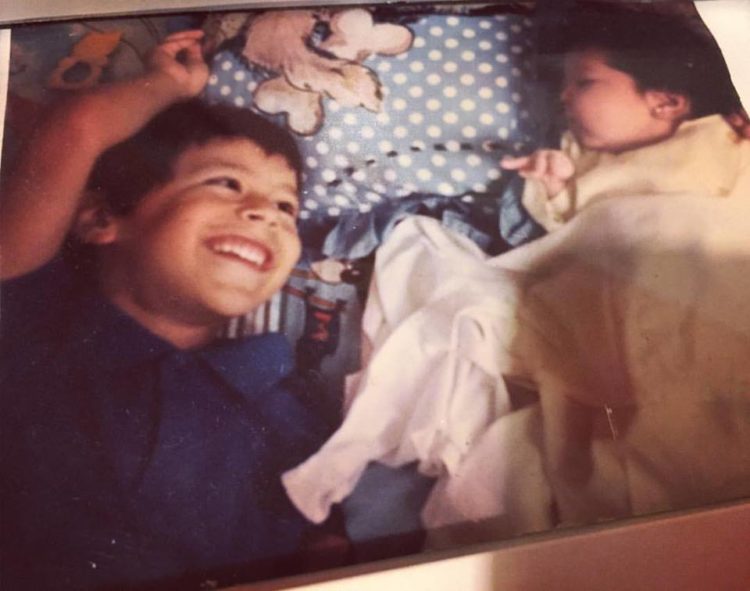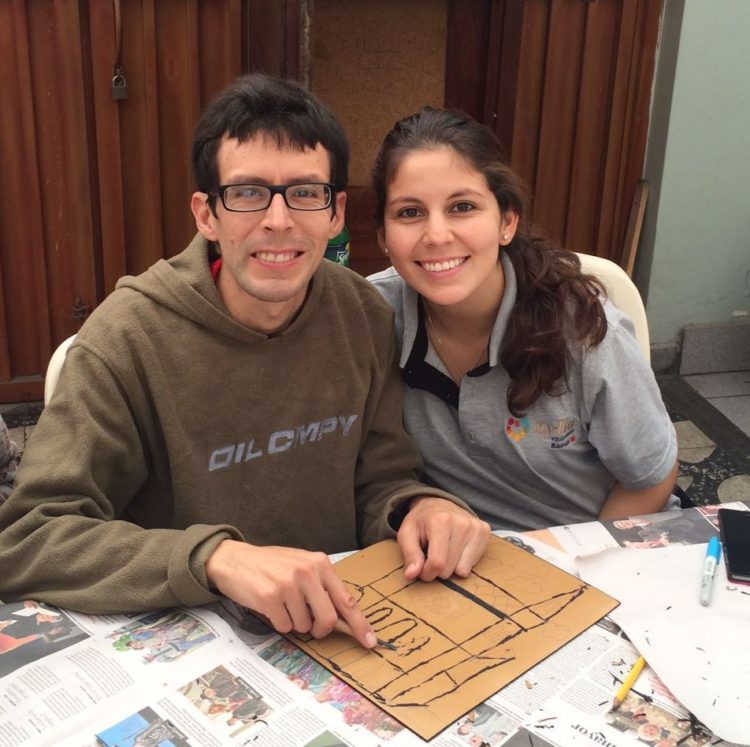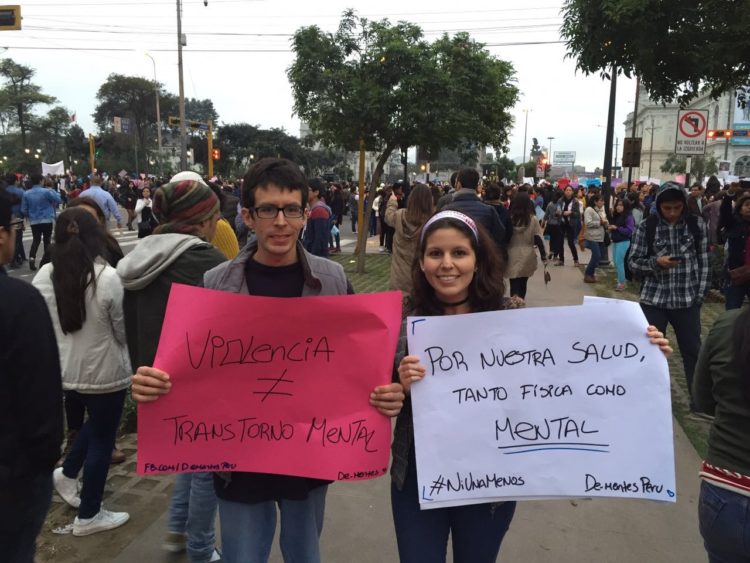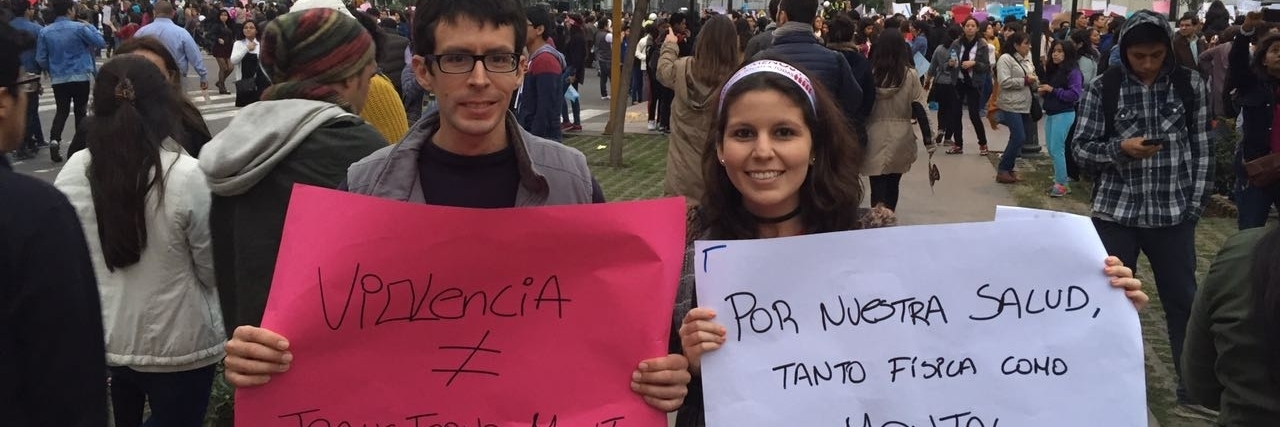When My Family Finally Started Talking About My Brother's Schizophrenia
Editor's Note
This story has been published with permission from the author’s brother.
My name is Lucero Andaluz and I live in Lima, Peru. I want to share my family’s story with you because I know it could inspire lots of people and it could help change minds around the world.
Over the past few years, I’ve learned that mental health is absolutely essential to anyone’s life and living together with stigma is far more difficult than living with a mental illness. My older brother was diagnosed with schizophrenia almost 20 years ago when he was just beginning puberty. Since that moment, my family and I have been through infinite experiences, both good and bad.
At the moment of the diagnosis, I was still very young; I was 8 years old and I didn’t understand why my brother was starting to act differently. It is important for me to share with you that the diagnosis came after a lot of visits to the psychologist: from our school’s psychologist, who did not have a clue of what was going on with my brother (in spite of studying in one of Lima’s most privileged schools), to other professionals that my parents visited before completely accepting what they already knew.  I have many childhood memories about my brother’s first psychiatrist involving the family therapy we used to have in his office, when the four of us were trying to understand this illness. There was my brother, Gonzalo, my dad, my mom and me entering this whole new world, a world that we never thought we’d get to know. Why? Well, no one in our family had schizophrenia and that made things even more difficult to understand. People around the world need to understand that no one is immune to this. We are all vulnerable and we all need to start looking at each other with more empathy and understanding.
I have many childhood memories about my brother’s first psychiatrist involving the family therapy we used to have in his office, when the four of us were trying to understand this illness. There was my brother, Gonzalo, my dad, my mom and me entering this whole new world, a world that we never thought we’d get to know. Why? Well, no one in our family had schizophrenia and that made things even more difficult to understand. People around the world need to understand that no one is immune to this. We are all vulnerable and we all need to start looking at each other with more empathy and understanding.
A few months after being diagnosed, Gonta, as I like to call my brother, had to leave the school we studied at because it became too demanding for him. Too demanding for my brother, who had always been first in his class since elementary school. My brother, who used to teach his classmates the school lessons. It seemed unbelievable. Also, his “situation” soon became too much for my school to handle. It became too complicated for his teachers, assistants and directors to deal with him being bullied because he heard voices, voices whose origins nobody could explain. Apparently there was no way he could keep studying there, in spite of his brilliant mind.
This was a huge hit for my family. But we dealt with it alone, the four of us. There was no way we would mention to my grandparents, uncles, aunts, cousins or friends that my brother had schizophrenia: that was impossible. And we kept it like that for a few years; we faced this illness by ourselves, in silence, without telling anyone.
But one day we could not handle it anymore, it’s as simple as that. From one second to the next, Gonta’s schizophrenia was at its worst: he had a crisis every day, and it became really difficult for us to handle it by ourselves. I remember how my aunts and uncles began to suspect something was wrong. One morning, Gonta’s godfather visited us, and the silence we kept for so long was broken. He witnessed what was probably one of my brother’s worst crises.  And that’s how a new journey began. My brother had to be admitted at a hospital. No medication was enough. It was terrible. I don’t wish it for anybody. Having to leave someone you care for that much, in the hands of nurses who you don’t know will respect his most basic human rights, is unbelievably painful. I can’t help to shed a few tears as I recall those days; they were really rough. I remember how we once got to the hospital and my brother had lost his senses, acting like a zombie. Someone had given him a medicine that basically made him drool and walk with no direction. Why? Because the hospital’s personnel didn’t want to handle him fully conscious. I also saw him wearing a straitjacket.
And that’s how a new journey began. My brother had to be admitted at a hospital. No medication was enough. It was terrible. I don’t wish it for anybody. Having to leave someone you care for that much, in the hands of nurses who you don’t know will respect his most basic human rights, is unbelievably painful. I can’t help to shed a few tears as I recall those days; they were really rough. I remember how we once got to the hospital and my brother had lost his senses, acting like a zombie. Someone had given him a medicine that basically made him drool and walk with no direction. Why? Because the hospital’s personnel didn’t want to handle him fully conscious. I also saw him wearing a straitjacket.
This was our breaking point. I saw my dad cry for the first time in my life. He was broken inside and he cried on his sister’s shoulder as we got out of the hospital. I think this was the first time that stigma broke in my family. It was finally OK to talk about my brother’s mental health and about how things were not going well. Several months passed by. Then, one day, we found a new medication that was being tested in Peru. The new treatment worked well for my brother and there’s no day we do not thank God for this blessing. We were so very lucky to find a treatment that, to this day, 12 years later, has kept my brother stable.
This is our story. It’s the one we’ve come to live and I am certain that we were given this life experience for a reason. Gonta is the inspiration behind De-mentes Perú, a nonprofit organization I founded a few years ago with the help of wonderful friends. Our purpose? To end mental health stigma. For me and my family, living together with mental health stigma made living with a mental illness completely unbearable. Today, we have understood that there’s no reaso we should hide our story, and that’s why I wanted to share it with you, for those who need a little hope like I did.  People seem to think that a person with schizophrenia is extremely violent and dangerous, but my brother really is the sweetest and most kind person you’ll ever meet. It’s easy to stigmatize when you haven’t experienced how difficult it is to live with a mental illness; we need to change this. We need to inform ourselves before looking to the one sitting next to us with prejudice, when you don’t know if he’s suffering or struggling in the inside. I’m certain we can put an end to mental health stigma if we all lead by this example.
People seem to think that a person with schizophrenia is extremely violent and dangerous, but my brother really is the sweetest and most kind person you’ll ever meet. It’s easy to stigmatize when you haven’t experienced how difficult it is to live with a mental illness; we need to change this. We need to inform ourselves before looking to the one sitting next to us with prejudice, when you don’t know if he’s suffering or struggling in the inside. I’m certain we can put an end to mental health stigma if we all lead by this example.
Photos submitted by contributor

